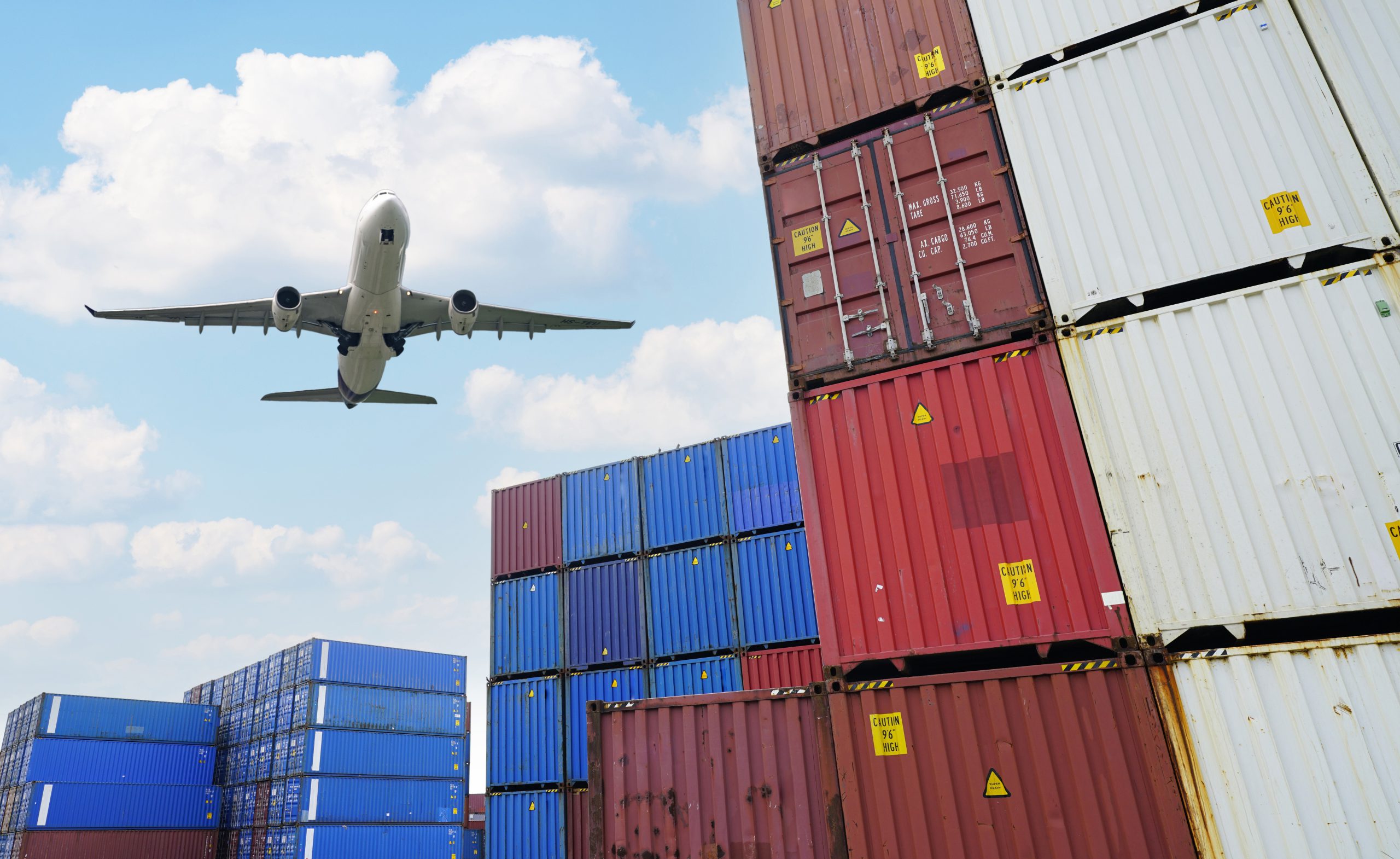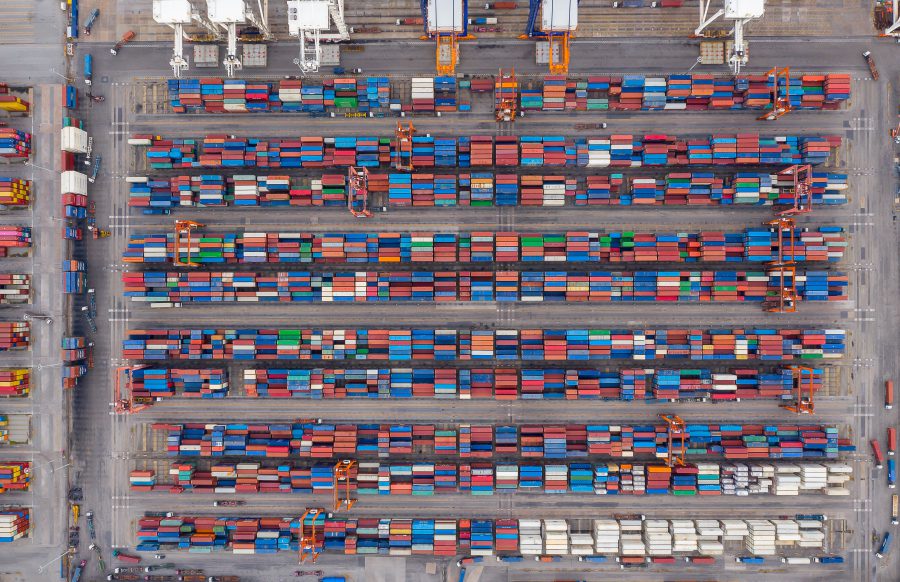International shipping, in simple terms, refers to the transfer of goods across borders via either land, air, or water.
The birth of the modern international shipping and logistics industry can be traced back to the industrial revolution at the turn of the 19th century. The development of the steam engine and the switch to mechanical production methods led to unprecedented growth in global production, increased incomes, higher consumption, and paved the way for globalization.
We now find ourselves in an age of consumerism, where no one country has all the resources and raw materials it needs to match growing domestic demand. Some countries, find themselves with an abundance of resources and not enough demand for them. This gap forms the foundation of global trade and gives rise to the demand for international shipping of goods.
Additionally, many businesses in countries all over the world have now expanded to serve international markets and need to transport their goods overseas, at times to multiple destinations, to meet their international demand.
Over time, countries have come to rely heavily on their imports and exports for continued economic development and prosperity. Likewise, success for businesses operating in multiple markets is predicated on their ability to efficiently send and receive goods from one country to another. The international shipping and logistics industry is, therefore, the backbone of the global economy.
The international shipping process
A business that is looking to send its goods overseas, either on its own or through an international shipping company, should have an understanding of how the international shipping process works. Unlike domestic shipping, which merely concerns the transport of goods from a source location to a destination, both of which are within the same country, international shipping is much more complex. It involves several stakeholders including the businesses that own the goods, international shipping companies, customs authorities, the final consumer, etc.
There are also several stages that goods have to pass through to reach the intended customer. Let’s take a closer look at these stages.


- Export haulage
The first step in international shipping is export haulage which refers to the transfer of goods from the premises of the consignor to that of the forwarder. In the case of less-than-container-load (LCL) shipments, the goods first move to a warehouse or handling facility belonging to the freight forwarder/international shipping company where they are packaged in a consignment consisting of various goods from multiple shippers. It is then transported to the port storage facility. On the other hand, full-container-load (FCL) shipments are directly moved from the location of the shipper to the port facility or warehouse of the forwarder.
- Export customs clearance shipping
The next step is where custom authorities of the origin country come into the picture. Cargo shipments that are on their way out of a country have to first pass custom checks, meet export regulations, and receive clearance before they can be shipped out. International shipping companies and freight forwarders with a customs license are responsible for declaring all the goods being shipped, compiling all the relevant documents, and submitting them in time to the authorities. This process is a must and cannot be completed by companies that don’t have a license.
Businesses, therefore, either have to outsource their shipping to an international shipping company or hire a customs house broker. A customs house broker is a customs license-bearing entity that assists businesses and freight forwarders with the customs clearance process.
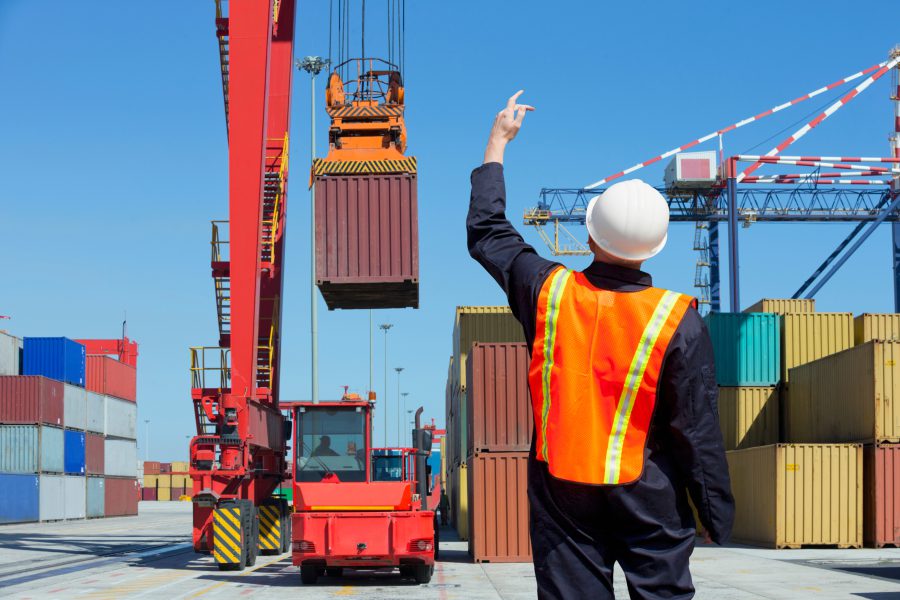

- Origin handling
In between receiving clearance from customs authorities and the cargo shipment leaving the country of origin, the international shipping company in charge of the consignment is responsible for checking the goods. The international shipping company needs to ensure the safety of the goods, tracking their movement to the port, packing the cargo into containers, and finally loading the containers in a truck, marine vessel, or airplane–depending on the method of transportation is being used.
While it is the forwarder that takes care of origin handling, the costs are not necessarily borne by the shipper. In case of a Free on Board (FOB) shipping point contract, the consignee pays for the costs of origin handling and in case of a FOB destination contract, the shipper takes care of all the costs until the cargo is delivered to the destination port or location of the consignee.
- International transportation
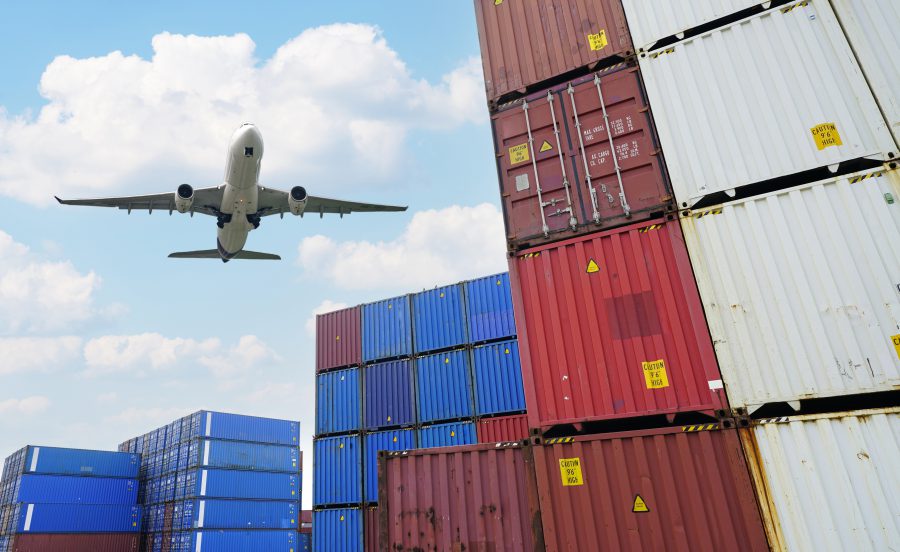

After successfully clearing customs and origin handling, the goods are sent on their way to the destination country. Depending on the size and quantity of the freight and the delivery time promised to the customer, a business can choose to ship their goods either via air, sea, or road. The cost of transportation is passed on either to the shipper or the consignee.
- Import customs clearance
A shipment also needs import customs clearance by the customs authorities of the destination country. The process of declaring the goods, submitting relevant documents, and receiving clearance are once again undertaken by the international shipping company that either has its own customs license or hires a customs broker/agent.
The process of getting import customs clearance can be initiated before the goods leave for the destination country. In any case, the goods cannot leave the port facility until the clearance is received.
- Destination handling company
Similar to origin handling, destination handling is taken care of by the international freight forwarding company. Before the goods can be released to the consignee, they need to be unloaded, checked, moved to the warehouse or storage facility of the forwarder, and then loaded onto delivery trucks, all while ensuring the safety of the cargo.
- Import haulage company
This is the last leg of the international shipping process and concerns the delivery of goods from the warehouse of the international shipping company to the address of the consignee. Some international shipping companies provide import haulage services themselves while others choose to outsource to an agent/external delivery service.
Selecting an international transportation method
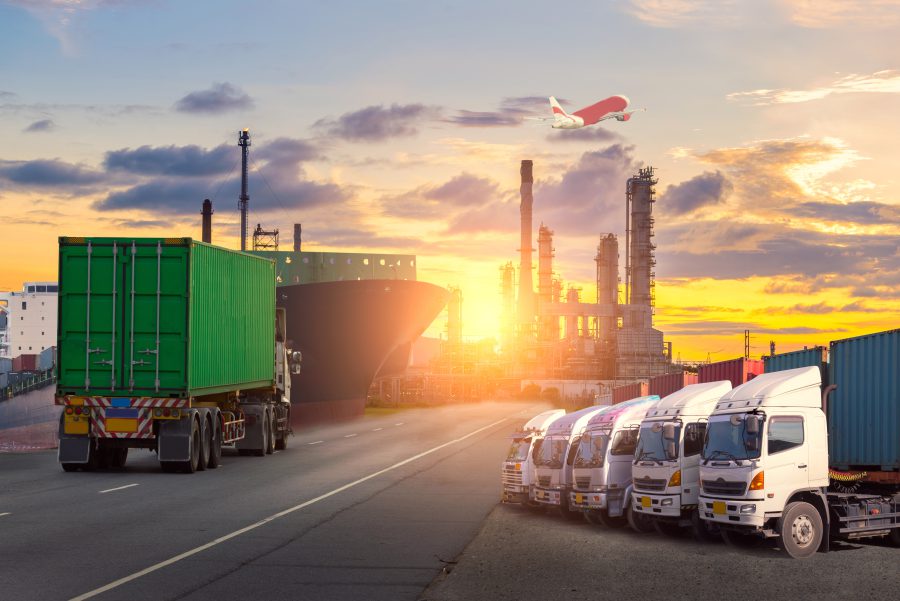

- Airfreight: Another term for air cargo, air freight refers to the transportation of goods through air carriers. Almost every airline in the world today operates a cargo division that focuses on handling and managing air cargo shipments.
There are several benefits to shipping through air freight. It is the fastest mode of shipping and has a global reach, meaning you can ship your goods anywhere in the world within hours. The chances of damage are minimum, and, in most cases, you can track your shipments in real-time. These advantages make air freight the preferred mode of international shipping for perishable goods and items that need to be delivered within a short period.
However, there are certain drawbacks to shipping by air. Air transport is much more expensive than moving goods via sea and land. It is also not possible to send big, heavy shipments via air. Airplanes have limited capacity and can only bear a certain amount of weight. Transportation of heavy machinery, raw materials, automobiles, etc., is therefore mostly done via sea or road.
- Sea freight:
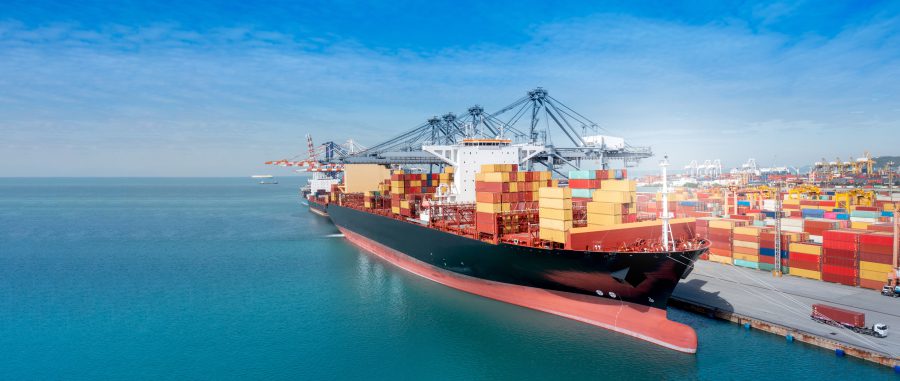

Sea freight refers to the transportation of goods on marine vessels and container ships. It has been reported that around 80% of global trade is done through maritime shipping, making it the most popular of the three modes of international shipping.
The importance of sea freight in turning the wheels of global economic activity was recently put on display when the Ever Given, one of the largest container ships in the world, blocked the Suez Canal for six days. It led to a loss of billions of dollars each day, caused oil prices to rocket, and disrupted global supply chains, leaving the international shipping industry in mayhem.
It is easy to see why sea freight is the preferred mode of transportation as it is by far the cheapest option out of the three. Marine shipping vessels are not as limited by space as their road and air counterparts and are capable of transporting bulky and large cargo shipments. Compared to aircraft and trucks, shipping vessels are also more eco-friendly since they don’t use as much petroleum and leave a smaller carbon trail. If your business is environmentally conscious, you may want to opt for maritime shipping.
However, if you are on a strict schedule, you may want to avoid shipping by sea. Container ships are much slower and have to cover long distances. Additionally, sea freight is more likely to encounter delays on part of the complex underlying procedure of getting ships loaded, checked, and ready for departure before every journey.
- Land freight: The transportation of goods via trucks or railways is known as land freight and is mostly used for short-distance cargo transportation. Land freight comes with its fair share of advantages. It’s cheaper than air freight, quicker than sea freight, and can be used to transport to less accessible areas. It is also a more flexible mode of shipment and services more routes.
Conversely, land freight is not suitable for transportation over longer distances. Unless land routes between the origin and destination countries are available and well-developed, long-haul road freight is avoided. It is also more susceptible to delays caused by vehicle accidents and breakdowns.
Outsourcing your international shipping needs


Regardless of the transportation method you choose, there is a considerable amount of work that goes into ensuring the successful international shipping of goods. If it wants to make timely deliveries to its customers, a business must carry out each step in the international shipping process outlined in this article efficiently, and doing so can end up taking a significant amount of time that most business owners can’t afford to spare. A business looking for success in an international market needs to focus on its core competencies—the territory, ensuring product quality, and providing premium customer service, etc., rather than worrying about the transportation of its goods.
Most businesses, therefore, choose to outsource their international shipping operations to international shipping companies that specialize in different or, in some cases, all aspects of the shipping process. International shipping companies are the bridge between the shipper and the entire shipping industry.
Here are the top three benefits your business can accrue by hiring an international company:
- Time and cost efficiency: Handling international shipping is a cumbersome process that involves dealing with various stakeholders and taking care of several things including warehousing, loading/off-loading, customs clearance, packaging, etc. This takes time and if not done with the utmost efficiency, can also end up costing businesses a lot more than they bargained for. Outsourcing the entire process to an international shipping company ends up saving a lot of time and energy.
These companies specialize in handling the shipping needs of businesses, know the ins and outs of the industry, have a wide industry network at their disposal, and are focused on improving the efficiency of international shipping. This puts them in a unique position to negotiate the best prices with transport operators, storage providers, delivery service providers, etc. This ensures cost-efficiency which the business can pass on to their customers and position themselves to gain higher market shares.
- Reduced risk of disruptions:


If there’s one thing that a consumer despises more than anything, it’s late deliveries. Businesses, therefore, strive to deliver on time. However, disruptions are bound to occur in international shipping, especially if customs regulations are not carefully followed.
A good international shipping company makes it a priority to follow and stay up to date on different customs laws of different countries. This allows them to go through the customs clearance stages quickly and smoothly. They are also better equipped and more experienced in dealing with disruptions that may occur at any stage of the process.
- A one-stop-shop: International shipping companies often provide an all-encompassing solution to a business’s international shipping They connect you with airlines, shipping liners, trucking companies, and customs brokers/agents. They also often provide a wide array of services including packaging, warehousing, and, in some cases, even delivery services. As a result, businesses are provided with a hassle-free international shipping experience.,.
Choosing The Right International Shipping Company For Your Business
The international shipping and logistics industry is massive and there are many companies you can choose from. The kind of international shipping company you employ will eventually depend on the size, scale, and specifics of your organization and product. This means that you first need to define your needs and requirements – the types of services you would like to have, the modes of transportation you want, and the average volume of shipments you expect. This information is crucial in helping you decide on a third-party logistics provider(3PL) and the forwarder’s ability to judge if they can do the job for you.
Listed below is a checklist of criteria you need to keep in mind when choosing the right int


ernational shipping partner:
- Make an accurate assessment of your shipping needs
Before starting on a search for an international shipping company you need to determine your exact requirements for a streamlined supply chain–where are your gaps and inefficiencies?
- Industry experience and area of expertise
It pays to be mindful of the fact that not all international shipping companies cater to everything, but rather have specialized areas of expertise. This can include transportation, warehousing, distribution, shipping, and receiving, or a combination of one or two of the services. If you are a smaller enterprise that is looking for support across a specific area of your business, you need to find a supplier who matches your needs with the correct kind of capabilities.
- Company financial security and sustainability


A shipping company’s financial standing and sustainability have a direct impact on your business. It is not uncommon for business partnerships to begin in good faith and later suffer due to poor revenue models. Before taking on an outside shipping company, examine their financial background thoroughly.
- Company credibility
Credibility is crucial if you want to build a long-term shipping partnership. To find a credible international shipping company, you have to investigate their industry and market reputation amongst customers, suppliers, and business partners. Have they consistently honored their business commitments and met expectations? Go through customer reviews, testimonials, and market feedback to ascertain how clients feel about them. Reach out into the industry through your resources and get evaluations of their services.
- Company network and reach capabilities
When considering partnering with an international shipping company, two of the obvious factors that you need to keep in mind is their network and reach capabilities. For the partnership to work, the shipping company must not only operate in the regions where you have demand but also in areas and territories that you plan to grow into. A 3PL or 4PL with a wide range of contacts has the additional advantage of helping your business grow into geographically diverse areas. They can act as endorsers and advocates for your services, helping you gain further validity and support.
- Customer service and support


In the fast-paced world of business, a company wants its problems addressed and questions answered on a priority basis. When a shipping company is not able to deliver on that front, it can make for a very frustrating partnership and be a cause for broken agreements.
- Company safety records
Shipping services are a sum of many moving parts that have to operate in perfect unison to ensure that everything goes smoothly. For this to happen your international shipping partner must have a proven safety management record and optimal facilities.
- Technology
Modern-day shipping has gone digital. That means your company’s supply chain data should be at your fingertips–at all times. This kind of transparency is non-negotiable in this day and age. A professional international shipping company, therefore, must be equipped with the latest technology innovations to offer transparency and efficiency.
- Company pricing
Before you decide on a shipping company you need to be asking yourself if their pricing is transparent or are there any hidden charges? The price charged by an international shipping company is a key metric for you to consider.
SBT is the Kingdom’s leading transportation, warehousing, and logistics service provider. Get in touch with us to find out more about how you can choose the right international shipping company to meet your shipping requirements.

